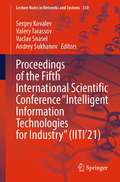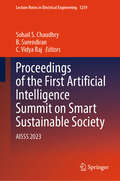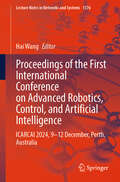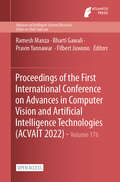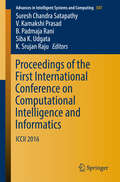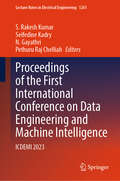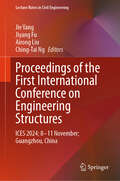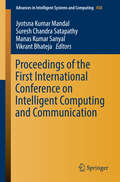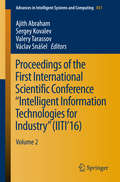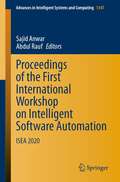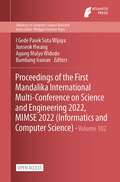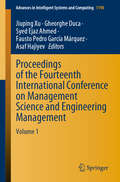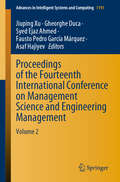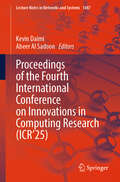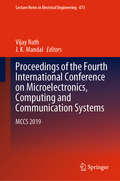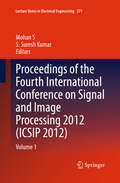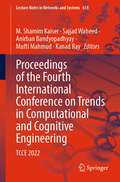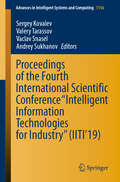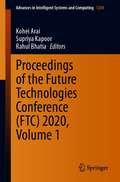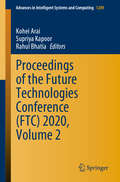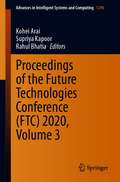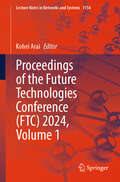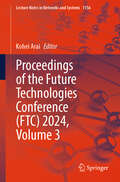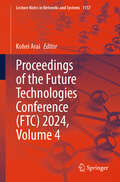- Table View
- List View
Proceedings of the Fifth International Scientific Conference “Intelligent Information Technologies for Industry” (Lecture Notes in Networks and Systems #330)
by Vaclav Snasel Sergey Kovalev Valery Tarassov Andrey SukhanovThis book presents key advances in intelligent information technologies for industry. This book of Lecture Notes in Networks and Systems contains the papers presented in the main track of IITI 2021, the Fifth International Scientific Conference on Intelligent Information Technologies for Industry held on September 30 – October 4, 2021 in Sirius, Russia. The conference was jointly co-organized by Rostov State Transport University (Russia) and VŠB–Technical University of Ostrava (Czech Republic) with the participation of Russian Association for Artificial Intelligence (RAAI) and Sirius University (Russia).IITI 2021 was devoted to practical models and industrial applications related to intelligent information systems. It was considered as a meeting point for researchers and practitioners to enable the implementation of advanced information technologies into various industries. Nevertheless, some theoretical talks concerning the state of the art in intelligent systems and soft computing were also included into proceedings.There were 180 paper submissions from 14 countries. Each submission was reviewed by at least three chairs or PC members. We accepted 69 regular papers (38\%). Unfortunately, due to limitations of conference topics and edited volumes, the Program Committee was forced to reject some interesting papers, which did not satisfy these topics or publisher requirements. We would like to thank all authors and reviewers for their work and valuable contributions. The friendly and welcoming attitude of conference supporters and contributors made this event a success!
Proceedings of the First Artificial Intelligence Summit on Smart Sustainable Society: AISSS 2023 (Lecture Notes in Electrical Engineering #1259)
by Sohail S. Chaudhry B. Surendiran C. Vidya RajThe book includes proceedings of AI Summit 2023: Towards a Smart Sustainable Society which serve as a collaborative platform for diverse communities to address and resolve societal challenges using Artificial Intelligence. This book enables experts and researchers to evaluate the advantages of AI-driven technological transformations. It covers an extensive array of topics in artificial intelligence and machine learning, including deep learning, image processing, convolutional neural networks, advanced neural networks, sensors, Internet of Things (IoT), and genetic algorithms.
Proceedings of the First International Conference on Advanced Robotics, Control, and Artificial Intelligence: ICARCAI 2024, 9–12 December, Perth, Australia (Lecture Notes in Networks and Systems #1376)
by Hai WangThis book highlights the latest research developments and outcomes on all aspects of advanced robotics, control and artificial intelligence. Particularly, it not only includes those emerging methodologies and techniques which bridge theoretical studies and applications in all robotics and control systems as well as artificial intelligence, but also involves the practical concerns and challenges encountered and potential solutions in those fields.
Proceedings of the First International Conference on Advances in Computer Vision and Artificial Intelligence Technologies (Advances in Intelligent Systems Research #176)
by Bharti Gawali Ramesh Manza Pravin Yannawar Filbert JuwonoThis is an open access book.The first international Conference on Advances in Computer Vision and Artificial Intelligence Technologies (ACVAIT 2022) is a biennial conference organized by Department of Computer Science and Information Technology, Dr. Babasaheb Ambedkar Marathwada University, Aurangabad (MS) India, during August 1–2, 2022. ACVAIT 2022, is dedicated towards advances in the theme areas of Computer Vision, Image Processing, Pattern Recognition, Artificial Intelligence, Machine Learning, Human Computer Interactions, Biomedical Image Processing, Geospatial Technology, Hyperspectral image processing and allied technologies but not limited to. ACVAIT 2022, invites young and/or advanced researchers contributing in the theme area of the conference and also provide them platform for discussing their scientific contributions / research findings with the domain experts, exchange ideas with them and foster closer collaboration between members from the top universities / Higher Education Institutes (HEI). ACVAIT 2022, inviting domain specific work from research scholars, academician, machine learning & AI scientist, industry experts to contribute their scientific contribution in the following areas but not limited to.• Shape representation• Biometrics: face matching, iris recognition, footprint verification and many more.• Statistical, Structural and syntactic pattern recognition• Brain Computer Interface and Human Computer Interactions• Feature extraction and reduction• Biomedical Image Processing• Color and texture analysis• Speech analysis and understanding• Image segmentation• Speaker verification & Synthesis• Image compression, coding and encryption• Clustering and classification• Object recognition, scene understanding and video analytics• Machine learning algorithms • Image matching (pattern matching)• Extreme learning machine• Content based image retrieval and indexing• Artificial Intelligence Trends in Deep learning• Optical character recognition• Big data• Image & Video Forensics• Information retrieval• Pattern recognition and machine learning for Internet of Things• Data mining and Data Analytics• Pattern classification through Sensors• Pattern Recognition for Hyper Spectral Imaging• Satellite Image Processing
Proceedings of the First International Conference on Computational Intelligence and Informatics
by Suresh Chandra Satapathy K. Srujan Raju Siba K. Udgata V. Kamakshi Prasad B. Padmaja RaniThe book covers a variety of topics which include data mining and data warehousing, high performance computing, parallel and distributed computing, computational intelligence, soft computing, big data, cloud computing, grid computing, cognitive computing, image processing, computer networks, wireless networks, social networks, wireless sensor networks, information and network security, web security, internet of things, bioinformatics and geoinformatics. The book is a collection of best papers submitted in the First International Conference on Computational Intelligence and Informatics (ICCII 2016) held during 28-30 May 2016 at JNTUH CEH, Hyderabad, India. It was hosted by Department of Computer Science and Engineering, JNTUH College of Engineering in association with Division V (Education & Research) CSI, India.
Proceedings of the First International Conference on Data Engineering and Machine Intelligence: ICDEMI 2023 (Lecture Notes in Electrical Engineering #1261)
by Seifedine Kadry Pethuru Raj Chelliah N. Gayathri S. Rakesh KumarThis volume constitutes peer-reviewed proceedings of the First International Conference on Data Engineering and Machine Intelligence, ICDEMI 2023. The research problems about data engineering and machine learning are covered in this book. The proceedings cover recent contributions and novel developments from researchers across industry and academia in data science, data engineering, artificial intelligence, big data, cloud computing, sustainability, and knowledge-based expert systems from technological and social perspectives. This book will serve as a valuable reference for researchers, instructors, students, scientists, engineers, managers, and industry practitioners.
Proceedings of the First International Conference on Engineering Structures: ICES 2024; 8-11 November; Guangzhou, China (Lecture Notes in Civil Engineering #599)
by Jie Yang Jiyang Fu Airong Liu Ching-Tai NgThis book includes peer reviews articles from the First International Conference on Engineering Structures (ICES2024), held at Guangzhou, China, on 8-11 November 2024. The conference is an international multi-disciplinary forum for scientists and engineers to disseminate the latest innovations and achievements, discuss current trends and emerging issues in structural engineering and structural mechanics communities, and promote information exchange within multidisciplinary field. The book focuses on new developments and innovative applications of structural and mechanics principles and digital technologies for the analysis and design of engineering structures.
Proceedings of the First International Conference on Intelligent Computing and Communication
by Suresh Chandra Satapathy Jyotsna Kumar Mandal Vikrant Bhateja Manas Kumar SanyalThe book covers a wide range of topics in Computer Science and Information Technology including swarm intelligence, artificial intelligence, evolutionary algorithms, and bio-inspired algorithms. It is a collection of papers presented at the First International Conference on Intelligent Computing and Communication (ICIC2) 2016. The prime areas of the conference are Intelligent Computing, Intelligent Communication, Bio-informatics, Geo-informatics, Algorithm, Graphics and Image Processing, Graph Labeling, Web Security, Privacy and e-Commerce, Computational Geometry, Service Orient Architecture, and Data Engineering.
Proceedings of the First International Scientific Conference "Intelligent Information Technologies for Industry" (IITI'16)
by Ajith Abraham Václav Snášel Sergey Kovalev Valery TarassovThis volumeof Advances in Intelligent Systems and Computing contains papers presented inthe main track of IITI 2016, the First International Conference on IntelligentInformation Technologies for Industry held in May 16-21 in Sochi, Russia. Theconference was jointly co-organized by Rostov State Transport University(Russia) and VSB - Technical University of Ostrava (Czech Republic) with theparticipation of Russian Association for Artificial Intelligence (RAAI) andRussian Association for Fuzzy Systems and Soft Computing (RAFSSC). The volume isdevoted to practical models and industrial applications related to intelligentinformation systems. The conference has been a meeting point for researchersand practitioners to enable the implementation of advanced informationtechnologies into various industries. Nevertheless, some theoretical talksconcerning the-state-of-the-art in intelligent systems and soft computing areincluded in the proceedings as well.
Proceedings of the First International Workshop on Intelligent Software Automation: ISEA 2020 (Advances in Intelligent Systems and Computing #1347)
by Abdul Rauf Sajid AnwarThis book is a collection of research papers presented at the International Workshop on Intelligent Software Engineering Automation (ISEA 2020) in the 27th Asia-Pacific Software Engineering Conference (APSEC 2020), during 1–4 December 2020 in Singapore. The book discusses automated tools and techniques which are required to reflect over business knowledge to identify what is missing or could be effectively changed while producing and evolving. The book presents works from international researchers and practitioners in the fields of intelligent software engineering/automated software engineering to discuss applications, experiences, and emerging advanced techniques.
Proceedings of the First Mandalika International Multi-Conference on Science and Engineering 2022, MIMSE 2022 (Advances in Computer Science Research #102)
by I Gede Pasek Suta Wijaya Junseok Hwang Agung Mulyo Widodo Bambang IrawanThis is an open access book. The covid-19 pandemic today forces humans to do almost all activities from home. Consequently, inventions in many fields of engineering technology are needed to facilitate those activities. First, human activities mainly are based on information technology today and internet connection is very important. People generate, send, and receive data by their smartphones every time and everything is connected to the internet. Equipment becomes smarter to assist the owner. Second, People need powerful, efficient, and smart vehicles and machines in Industry 4.0. Third, the need for energy increases, which causes the decrease of global environmental quality. It needs new technology for saving energy by discovering new technologies in mechanical engineering. Fourth, many technologies emerge as disaster prevention by developing innovations in civil engineering and architecture.The Engineering Faculty of University of Mataram invites engineers and researchers around the world to visit Lombok island and to attend the valuable multi fields conference on science and engineering named “The First Mandalika International Multi-conference on Science and Engineering 2022″ or “1st MIMSE 2022”. This fruitful event will be the annual conference in Lombok island which is supported by the West Nusa Tenggara Province government. Initially, the 1st MIMSE 2022 consisted of 5 engineering fields are Civil, Architecture, Electrical, Mechanical, and Informatics Engineering.
Proceedings of the Fourteenth International Conference on Management Science and Engineering Management: Volume 1 (Advances in Intelligent Systems and Computing #1190)
by Fausto Pedro García Márquez Jiuping Xu Gheorghe Duca Asaf Hajiyev Syed Ejaz AhmedThis book gathers the proceedings of the 14th International Conference on Management Science and Engineering Management (ICMSEM 2020). Held at the Academy of Studies of Moldova from July 30 to August 2, 2020, the conference provided a platform for researchers and practitioners in the field to share their ideas and experiences.Covering a wide range of topics, including hot management issues in engineering science, the book presents novel ideas and the latest research advances in the area of management science and engineering management. It includes both theoretical and practical studies of management science applied in computing methodology, highlighting advanced management concepts, and computing technologies for decision-making problems involving large, uncertain and unstructured data. The book also describes the changes and challenges relating to decision-making procedures at the dawn of the big data era, and discusses new technologies for analysis, capture, search, sharing, storage, transfer and visualization, and in the context of privacy violations, as well as advances in the integration of optimization, statistics and data mining. Given its scope, it will appeal to a wide readership, particularly those looking for new ideas and research directions.
Proceedings of the Fourteenth International Conference on Management Science and Engineering Management: Volume 2 (Advances in Intelligent Systems and Computing #1191)
by Fausto Pedro García Márquez Jiuping Xu Gheorghe Duca Asaf Hajiyev Syed Ejaz AhmedThis book gathers the proceedings of the 14th International Conference on Management Science and Engineering Management (ICMSEM 2020). Held at the Academy of Studies of Moldova from July 30 to August 2, 2020, the conference provided a platform for researchers and practitioners in the field to share their ideas and experiences.Covering a wide range of topics, including hot management issues in engineering science, the book presents novel ideas and the latest research advances in the area of management science and engineering management. It includes both theoretical and practical studies of management science applied in computing methodology, highlighting advanced management concepts, and computing technologies for decision-making problems involving large, uncertain and unstructured data. The book also describes the changes and challenges relating to decision-making procedures at the dawn of the big data era, and discusses new technologies for analysis, capture, search, sharing, storage, transfer and visualization, as well as advances in the integration of optimization, statistics and data mining. Given its scope, it will appeal to a wide readership, particularly those looking for new ideas and research directions.
Proceedings of the Fourth International Conference on Innovations in Computing Research (Lecture Notes in Networks and Systems #1487)
by Kevin Daimi Abeer AlsadoonThis book concentrates on innovations in research in the areas of Data Science, Computer Science and Computer Engineering Education, Computer and Network Security, Health Informatics and Digital Imaging, Internet of Things, Smart Cities and Smart Energy, and Quantum Computing The Fourth International Conference on Innovations in Computing Research (ICR&’25), August 25–27, 2025, London, UK, brings together a diverse group of researchers from all over the world with the intent of fostering collaboration and dissemination of the innovations in computing technologies. The conference is aptly segmented into seven tracks to promote a birds-of-the-same-feather congregation and maximize participation. This book introduces the concepts, techniques, methods, approaches, and trends needed by researchers, graduate students, specialists, and educators for keeping current and enhancing their research and knowledge in these areas.
Proceedings of the Fourth International Conference on Microelectronics, Computing and Communication Systems: MCCS 2019 (Lecture Notes in Electrical Engineering #673)
by J. K. Mandal Vijay NathThis book presents high-quality papers from the Fourth International Conference on Microelectronics, Computing & Communication Systems (MCCS 2019). It discusses the latest technological trends and advances in MEMS and nanoelectronics, wireless communication, optical communication, instrumentation, signal processing, image processing, bioengineering, green energy, hybrid vehicles, environmental science, weather forecasting, cloud computing, renewable energy, RFID, CMOS sensors, actuators, transducers, telemetry systems, embedded systems and sensor network applications. It includes papers based on original theoretical, practical and experimental simulations, development, applications, measurements and testing. The applications and solutions discussed here provide excellent reference material for future product development.
Proceedings of the Fourth International Conference on Signal and Image Processing 2012 (ICSIP #2012)
by Mohan S S Suresh KumarThe proceedings includes cutting-edge research articles from the Fourth International Conference on Signal and Image Processing (ICSIP), which is organised by Dr. N.G.P. Institute of Technology, Kalapatti, Coimbatore. The Conference provides academia and industry to discuss and present the latest technological advances and research results in the fields of theoretical, experimental, and application of signal, image and video processing. The book provides latest and most informative content from engineers and scientists in signal, image and video processing from around the world, which will benefit the future research community to work in a more cohesive and collaborative way.
Proceedings of the Fourth International Conference on Trends in Computational and Cognitive Engineering: TCCE 2022 (Lecture Notes in Networks and Systems #618)
by Kanad Ray Anirban Bandyopadhyay Mufti Mahmud M. Shamim Kaiser Sajjad WaheedThis book presents various computational and cognitive modeling approaches in the areas of health, education, finance, environment, engineering, commerce, and industry. It is a collection of selected conference papers presented at the 4th International Conference on Trends in Cognitive Computation Engineering (TCCE 2022), hosted by Mawlana Bhashani Science and Technology University, Tangail, Bangladesh, during December 17–18, 2022. It shares cutting-edge insights and ideas from mathematicians, engineers, scientists, and researchers and discusses fresh perspectives on problem solving in a range of research areas.
Proceedings of the Fourth International Scientific Conference “Intelligent Information Technologies for Industry” (Advances in Intelligent Systems and Computing #1156)
by Vaclav Snasel Sergey Kovalev Valery Tarassov Andrey SukhanovThis book gathers papers presented in the main track of IITI 2019, the Fourth International Scientific Conference on Intelligent Information Technologies for Industry, held in Ostrava–Prague, Czech Republic on December 2–7, 2019. The conference was jointly organized by Rostov State Transport University (Russia) and VŠB – Technical University of Ostrava (Czech Republic) with the participation of the Russian Association for Artificial Intelligence (RAAI). IITI 2019 was devoted to practical models and industrial applications of intelligent information systems. Though chiefly intended to promote the implementation of advanced information technologies in various industries, topics such as the state of the art in intelligent systems and soft computing were also discussed.
Proceedings of the Future Technologies Conference (Advances in Intelligent Systems and Computing #1288)
by Kohei Arai Supriya Kapoor Rahul BhatiaThis book provides the state-of-the-art intelligent methods and techniques for solving real-world problems along with a vision of the future research.The fifth 2020 Future Technologies Conference was organized virtually and received a total of 590 submissions from academic pioneering researchers, scientists, industrial engineers, and students from all over the world. The submitted papers covered a wide range of important topics including but not limited to computing, electronics, artificial intelligence, robotics, security and communications and their applications to the real world. After a double-blind peer review process, 210 submissions (including 6 poster papers) have been selected to be included in these proceedings.One of the meaningful and valuable dimensions of this conference is the way it brings together a large group of technology geniuses in one venue to not only present breakthrough research in future technologies, but also to promote discussions and debate of relevant issues, challenges, opportunities and research findings. The authors hope that readers find the book interesting, exciting and inspiring
Proceedings of the Future Technologies Conference (Advances in Intelligent Systems and Computing #1289)
by Kohei Arai Supriya Kapoor Rahul BhatiaThis book provides the state-of-the-art intelligent methods and techniques for solving real-world problems along with a vision of the future research.The fifth 2020 Future Technologies Conference was organized virtually and received a total of 590 submissions from academic pioneering researchers, scientists, industrial engineers, and students from all over the world. The submitted papers covered a wide range of important topics including but not limited to computing, electronics, artificial intelligence, robotics, security and communications and their applications to the real world. After a double-blind peer review process, 210 submissions (including 6 poster papers) have been selected to be included in these proceedings.One of the meaningful and valuable dimensions of this conference is the way it brings together a large group of technology geniuses in one venue to not only present breakthrough research in future technologies, but also to promote discussions and debate of relevant issues, challenges, opportunities and research findings. The authors hope that readers find the book interesting, exciting and inspiring.
Proceedings of the Future Technologies Conference (Advances in Intelligent Systems and Computing #1290)
by Kohei Arai Supriya Kapoor Rahul BhatiaThis book provides the state-of-the-art intelligent methods and techniques for solving real-world problems along with a vision of the future research.The fifth 2020 Future Technologies Conference was organized virtually and received a total of 590 submissions from academic pioneering researchers, scientists, industrial engineers, and students from all over the world. The submitted papers covered a wide range of important topics including but not limited to computing, electronics, artificial intelligence, robotics, security and communications and their applications to the real world. After a double-blind peer review process, 210 submissions (including 6 poster papers) have been selected to be included in these proceedings.One of the meaningful and valuable dimensions of this conference is the way it brings together a large group of technology geniuses in one venue to not only present breakthrough research in future technologies, but also to promote discussions and debate of relevant issues, challenges, opportunities and research findings. The authors hope that readers find the book interesting, exciting and inspiring.
Proceedings of the Future Technologies Conference (Lecture Notes in Networks and Systems #1154)
by Kohei AraiThis book covers proceedings of the Future Technologies Conference (FTC) 2024 which showcase a collection of thoroughly researched studies presented at the ninth Future Technologies Conference, held in London, the UK. This premier annual event highlights groundbreaking research in artificial intelligence, computer vision, data science, computing, ambient intelligence, and related fields. With 476 submissions, FTC 2024 gathers visionary minds to explore innovative solutions to today's most pressing challenges. The 173 selected papers represent cutting-edge advancements that foster vital conversations and future collaborations in the realm of information technologies. The authors extend their deepest gratitude to all contributors, reviewers, and participants for making FTC 2024 an unparalleled success. The authors hope this volume inspires and informs its readers, encouraging continued exploration and innovation in future technologies.
Proceedings of the Future Technologies Conference (Lecture Notes in Networks and Systems #1155)
by Kohei AraiThis book covers proceedings of the Future Technologies Conference (FTC) 2024 which showcase a collection of thoroughly researched studies presented at the ninth Future Technologies Conference, held in London, the UK. This premier annual event highlights groundbreaking research in artificial intelligence, computer vision, data science, computing, ambient intelligence, and related fields. With 476 submissions, FTC 2024 gathers visionary minds to explore innovative solutions to today's most pressing challenges. The 173 selected papers represent cutting-edge advancements that foster vital conversations and future collaborations in the realm of information technologies. The authors extend their deepest gratitude to all contributors, reviewers, and participants for making FTC 2024 an unparalleled success. The authors hope this volume inspires and informs its readers, encouraging continued exploration and innovation in future technologies.
Proceedings of the Future Technologies Conference (Lecture Notes in Networks and Systems #1156)
by Kohei AraiThis book covers proceedings of the Future Technologies Conference (FTC) 2024 which showcase a collection of thoroughly researched studies presented at the ninth Future Technologies Conference, held in London, the UK. This premier annual event highlights groundbreaking research in artificial intelligence, computer vision, data science, computing, ambient intelligence, and related fields. With 476 submissions, FTC 2024 gathers visionary minds to explore innovative solutions to today's most pressing challenges. The 173 selected papers represent cutting-edge advancements that foster vital conversations and future collaborations in the realm of information technologies. The authors extend their deepest gratitude to all contributors, reviewers, and participants for making FTC 2024 an unparalleled success. The authors hope this volume inspires and informs its readers, encouraging continued exploration and innovation in future technologies.
Proceedings of the Future Technologies Conference (Lecture Notes in Networks and Systems #1157)
by Kohei AraiThis book covers proceedings of the Future Technologies Conference (FTC) 2024 which showcase a collection of thoroughly researched studies presented at the ninth Future Technologies Conference, held in London, the UK. This premier annual event highlights groundbreaking research in artificial intelligence, computer vision, data science, computing, ambient intelligence, and related fields. With 476 submissions, FTC 2024 gathers visionary minds to explore innovative solutions to today's most pressing challenges. The 172 selected papers represent cutting-edge advancements that foster vital conversations and future collaborations in the realm of information technologies. The authors extend their deepest gratitude to all contributors, reviewers, and participants for making FTC 2024 an unparalleled success. The authors hope this volume inspires and informs its readers, encouraging continued exploration and innovation in future technologies.
